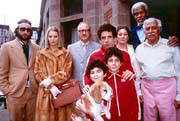Directed by Wes Anderson; starring Gene Hackman, Danny Glover, Anjelica Huston, Bill Murray, Gwyneth Paltrow, Ben Stiller, Owen Wilson, and Luke Wilson.
Watching The Royal Tenenbaums is like unwrapping an enormous birthday present that has been painstakingly shrouded in designer paper and sateen bows to find, buried beneath a bounty of tissue paper and other assorted package stuffers, a $50 gift certificate to the Gap. This is not to say that the movie is all style and no substance – 50 dollars can buy a lot at the Gap. It’s just that the present takes on empty irony when wrapped in a cloak fit for a diamond ring.
Such is the case with Wes Anderson’s latest film The Royal Tenenbaums, a portrait of an American family who are anything but all-American.
Gene Hackman leads the cast as Royal Tenenbaum, the clan’s unconventional patriarch. Angelica Huston plays Etheline, Royal’s estranged wife. Together they have three children, Chas (Ben Stiller), Richie (Luke Wilson) and Margot (Gwyneth Paltrow). Early in their lives, the Tenenbaum’s progeny showed great sings of prodigy: Chas was a financial genius, Richie was a tennis champion, and Margot was an award-winning playwright. And then Royal and Etheline split up. After a lifetime of neglect from their father, the children developed into troubled shadows of their younger selves: Chas, the father of two sons, becomes paranoid about possible disasters after his wife is killed in a plane crash; Richie has a meltdown during a National Championship match and spends his days traversing the globe on an ocean liner while pining for his sister, who is adopted; and Margot, after a period characterized by prolific sexual exploration, marries a much older man and spends the bulk of her day in the bathtub chain-smoking cigarettes. Needless to say, prior to the start of the film, she hadn’t written a play in years.
Rounding out the colorful cast are Bill Murray as Margot’s husband Raleigh St. Clair; Owen Wilson as the Tenenbaum’s drug-addicted adveturous neighbor Eli Cash; Kumar Pallena as Royal’s henchman, Pagoda; and Danny Glover as Henry, Etheline’s shy accountant who asks her to marry him. When Royal learns of his wife’s potential pending nuptials, he attempts to woo her back by faking stomach cancer. After 17 years, he moves back home along with his children who are, each in their own way, unequivocally unequipped to handle the world. The result is a dysfunctional family reunion replete with deceit, distrust and incest of the Woody/Soon Yi-sort.
Like Anderson’s earlier films (Bottle Rocket and Rushmore), The Royal Tenenbaums is best described as delightfully quirky: it’s a delightfully quirky story about delightfully quirky characters told using a delightfully quirky aesthetic. Unlike Rushmore, however, The Royal Tenenbaums is made up of too many quirky characters, which might account for some of the film’s style vs. substance problems. While the immediate family members all deliver quietly poignant performances (especially poignant is Gwyneth Paltrow who, without hiding behind an English accent, perfectly depicts a tortured artist’s tacit desperation), the peripheral characters like Murray’s St. Clair and Wilson’s Cash are almost cartoon-like in their one-dimensionality. As they wander in and out of the story, they sap the family’s more developed pathos. Thanks, in part, to this cluttered canvas, The Royal Tenenbaums is missing a certain something that would elevate it from a delightfully quirky family portrait to a timeless work of art. – JoAnne Steglitz
